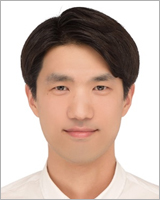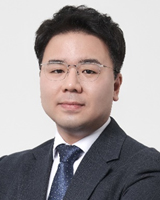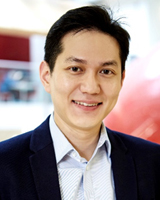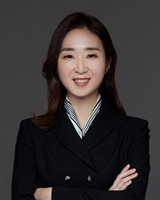
ModeratorMinseok Choi
- Organization, Position : Professor, Kyung Hee University, Department of Electronics Engineering
- Curriculum Vitae
- 2022~present: Professor, Electronics Engineering, Kyung Hee University
- 2020~2021: Professor, Telecommunication Engineering, Jeju National University
- 2018: BS, MS, PhD, Electrical Engineering, KAIST
- Minseok Choi is currently a professor in electronics engineering with with Kyung Hee University, Yongin, Korea, since 2022. Before joining Kyung Hee University, he received B.S., M.S., and Ph.D. degrees from the School of Electrical Engineering, Korea Advanced Institute of Science and Technology (KAIST), Daejeon, South Korea, in 2011, 2013, and 2018, respectively. He was a Visiting Postdoctoral Researcher in electrical and computer engineering with the University of Southern California (USC), Los Angeles, CA, USA, and he was an assistant professor at Jeju National University, Jeju, South Korea, from 2020 to 2022. His research interests include wireless
caching networks, stochastic network optimization, federated learning and reinforcement learning.

Establishing policies for digital technology with emphasis on humanistic valuesHeechul An
- Organization, Position : Partner, D'LIGHT Law Group
- Curriculum Vitae
- 2022~Present: Mentor, AI Yangjae Hub & Seoul Fintech Lab
- 2022~Present: Information Protection Cluster Advisory Committee, Korea Information Protection Industry Association
- 2021~Present: Head of Team, Startup Legal Support Team
- Mr. An has gained work experience in areas, such as Start-up, AI, data, Deep-tech. He is a partner and head of the Policy Center at D’LIGHT. Leading on from his experience advising a number of Start-ups, VCs, and Accelerators, he was selected to be one of nine Young Lawyer Of The Year Finalists by Asia Legal Business, leading legal magazine.
In 2022, he was selected as a Rising Stars Lawyer by the Legal Times, with further recognitions by the Minister of SMEs and Startups in the same year. Mr. An has become a mentor for many associations, which include but are not limited to the following: Korea Startup Promotion Agency, SBA, Korea Information Security Industry Association Information Security Cluster. As the head of the Policy Center, Mr. An is trying to present the policy direction of AI and data in the age of AI and digital transformation.
With the advancement of artificial intelligence (AI) technology and the collection and use of numerous data including personal information of people, global citizens have gone beyond being interconnected and now we have a society where people, technology and objects are connected together. In the past, digital technology simply played the role of providing help in the process of collecting and using information, but now it has become a fundamental factor that completely changes the method of living and the direction of life. Digital technology immensely improves efficiency and provides economic feasibility, but on the other hand, it leads to issues of extreme information gap, and isolation and exclusion of the digitally marginalized (elderly, disabled, low-income class and so forth). Therefore, we need to recognize the approach and utilization rights of digital technology as basic human rights to welcome the people-centric AI era, and we need to proactively enhance the limits of digital technology through the enforcement of policy and revision of relevant laws such as Digital Inclusion Act. In addition, there is a need to establish an ethical and legal system and policies for digital technology with an emphasis of humanistic values such as privacy, accountability, security, human control over technology, and promotion of human values as the prioritized philosophy.

Digital Governance: Between Technology & ParticipationKyung Ryul Park
- Organization, Position : Professor, KAIST Graduate School of Science and Technology
- Curriculum Vitae
- 2018~Present: Professor, KAIST, Graduate School of Science and Technology
- 2010~2014: World Bank, Innovation Labs, Open Aid Specialist
- Park, Kyung Ryul is a Professor in the Graduate School of Science and Technology Policy, and Adjunct Professor in the College of Business at KAIST. He served the KAIST AI Institute, AI & Society Committee as the Chair. He received his Ph.D. in Information Systems and Innovation from London School of Economics and Political Science (LSE).
He holds a Master’s degree in Public Policy from Harvard Kennedy School and B.S. in Chemical and Biological Engineering, and B.A. in International Relations from Seoul National University.
Park's research focuses on national development strategy, data-driven policy and global technology politics.
Prior to KAIST, he worked in the field of international development for seven years including the World Bank, KOICA, IVI, and UN WIPO. He worked in Tanzania, India, Kenya and Indonesia.
He has served as a member of the Advisory Committee in Ministry of Foreign Affairs; Ministry of Science and ICT and the National Committee of International Development Cooperation.

Smart City in the AI EraSoonmin Bae
- Organization, Position : Senior Vice President, KT AI2XL
- Curriculum Vitae
- 2022~Present: Presidential Committee on Digital Platform Government
- 2021~Present: KT AI2XL Senior Vice President
- 2009: MIT CSAIL/EECS Ph.D
- Dr. Soonmin Bae aims to transform AI technology into meaningful services. To this end, she directed teams on Video Intelligence and Avatar at NAVER Clova and led Vision AI team for Robotics and security cameras at Samsung Techwin.
In 2021, she joined KT to further transform KT from a telecommunication company to a digital platform company focusing on artificial intelligence, big data, and cloud computing R&D and businesses.
In addition, as part of her commitment to national science and technology strategies and governmental digital transformation, she has been engaged in various advisory committee activities including the National Strategic Technology Planning Advisory Group, the Presidential Digital Platform Government Committee, and the Fourth Industrial Revolution Committee of Seoul.
Prior to industrial experiences, she worked on computational photography and received her Ph.D. and M.S. in EECS/CSAIL at MIT and earned her B.S. at KAIST.
The reality is that we cannot avoid urbanization in the modern society. Digital technology is advancing surprisingly quickly, and this is worsening the digital divide. Such a digital divide could easily lead to social division.
Countries and local governments need to establish an AI strategy so that there are more subjects who can benefit from technology. It is important to expand the area that can apply AI technology by enhancing the quality and widening the scope of data collection. We urgently need to create an ecosystem for small business owners and small and medium-sized enterprises that may have difficulty in securing infrastructure or technological expertise. Efforts to apply and advance AI technology will naturally lead to the construction of the smart city.